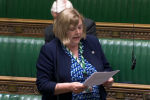Transcript:
I welcome today’s debate on this very important issue. I congratulate my hon. Friends the Members for Hastings and Rye (Sally-Ann Hart) and for Darlington (Peter Gibson) on securing this excellent debate.
Everyone should receive appropriate and dignified care, personalised to their individual needs, as they approach the end of their life. Hospices are central to delivering that care, including LOROS hospice for adults, based in Leicester West, which provides care to my terminally ill adult constituents, and the fantastic Rainbows hospice for babies, children and young people, located in my Loughborough constituency.
Since becoming an MP, I have visited Rainbows hospice on a number of occasions and seen at first hand the professionalism and dedication of its staff, who provide the highest levels of care to around 300 of the estimated 1,739 children and young people with life-limiting conditions in Leicester, Leicestershire, and Rutland, as well as their families. Rainbows also cares for hundreds more babies, children and young people with serious and terminal conditions across the wider east midlands area, providing support at its hospice in Loughborough, as well as in local hospitals and at home.
Rainbows is particularly concerned about the access of children and families to round-the-clock end of life care at home, provided by nurses and supported by advice from consultant paediatricians specially trained in paediatric palliative medicine. I am told that only a third of local areas in England are meeting the required standards in this area. Rainbows has informed me that in Leicester, Leicestershire and Rutland there is no 24-hour end of life care available at home, other than that based on goodwill provision from the Diana team. Therefore, in October 2023 Rainbows launched its hospice at home service, which it provides jointly with community nursing teams. However, there are no paediatric palliative consultants across the east midlands and no funding available to support this essential service. As such, Rainbows is currently paying for remote support from a consultant in another region.
Rainbows also funds two clinical nursing specialists working at the Leicester Royal Infirmary. In addition, it provides paediatric palliative care single point of contact, which is a pilot and is currently funded by the Paediatric Palliative Care Network, although the future of this funding is not guaranteed. Furthermore, Rainbows provides end of life care, symptom control and short breaks at its hospice in Loughborough. Its therapists offer support in the hospital, and provide ongoing bereavement support to families.
I am told that in 2024-25 it will cost Rainbows £12.1 million to provide its services. Over the same period it will receive roughly £1.7 million in statutory funding, which works out to be around 14% of its costs—enough to keep it open for only seven weeks. It will also receive £99,000 from Leicester, Leicestershire and Rutland integrated care board and £1.4 million from the children’s hospice grant for all five counties. This income totals £3.2 million, leaving a shortfall of £8.9 million, which Rainbows has to try to find itself.
Furthermore, although Rainbows has been told that it will receive the children’s hospice grant for 2024-25, the ICB has still not confirmed whether it will receive the funding in subsequent years. Together for Short Lives has also highlighted that, while ICBs and hospices are now clearer about their process for distributing the grant—thanks to the confirmation from the Government —it still remains unclear when and how hospices will receive the funding from ICBs and to what extent NHS England will hold ICBs to account in ensuring that the money is paid out. As a result, at the moment hospices do not have the reassurance of a long-term NHS funding plan, so I seek clarification from the Minister on those points.
Although Rainbows is fantastic at fundraising, its current position is simply not sustainable, particularly given that the number of children with life-limiting or life-threatening conditions is increasing. If we restrict the services that existing hospices provide by not supporting them with adequate funding, the provision will have to be found elsewhere, and responsibility will likely fall on the state. I therefore encourage the Government and NHS England to accept Together for Short Lives’ recommendation to review children’s palliative care funding going forward and to fill the £295 million annual gap in NHS spending on children’s palliative care in 2024-25. This should either be met centrally by maintaining ringfenced NHS England funding beyond 2024-25, or by setting out a framework under which ICBs are required to provide sustainable funding.
If urgent action is not taken, I share Rainbows’ concerns that more seriously ill children and their families will be denied choice and control over their palliative and end of life care.
In conclusion, I ask the Minister not to change a single atom of LOROS hospice or Rainbows children’s hospice, because they both provide excellent care. However, I urge her please to work alongside them as much she can and to get the ICBs, in particular, to deliver on the funding that was mentioned earlier in the debate.

